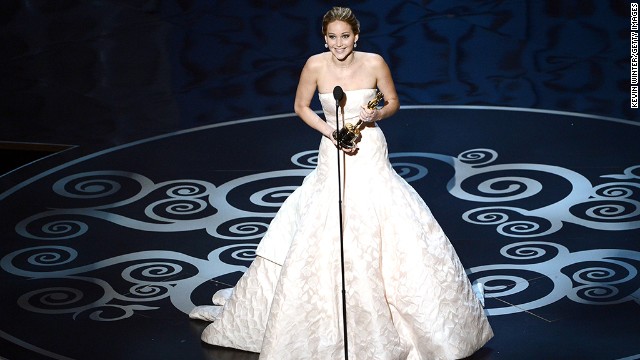
STORY HIGHLIGHTS
- NEW: An individual close to Ariana Grande says photos claiming to show her are "completely fake"
- Online posts purport to show nude photographs of actress Jennifer Lawrence
- Her publicist says it's a "flagrant violation of privacy" and authorities have been notified
- Other celebrities also report they were hacked
FBI, Apple investigate nude photo leak targeting Jennifer Lawrence, others
updated 8:21 AM EDT, Tue September 2, 2014
Source: CNN
STORY HIGHLIGHTS
- NEW: Some celebs "have engaged with the FBI" about the hacking, a U.S. official says
- Apple says company is "actively investigating this report"
- Online posts show nude photographs of actress Jennifer Lawrence
- Other celebrities also report they were hacked, some say photos were doctored
Nude photographs of Lawrence, who won an Academy Award last year for her role in "Silver Linings Playbook," were splashed on various sites Sunday. They appeared on 4chan, Reddit, Twitter and Tumblr, among others.
Kate Upton's lawyer confirmed photos of the model-actress were among those leaked, calling it "an outrageous violation" of her privacy. "We intend to pursue anyone disseminating or duplicating these illegally obtained images to the fullest extent possible," attorney Lawrence Shire said.
Lawrence Shire said.
 Lawrence Shire said.
Lawrence Shire said.
Lawrence's publicist said "authorities have been contacted and will prosecute anyone who posts the stolen photos of Jennifer Lawrence."
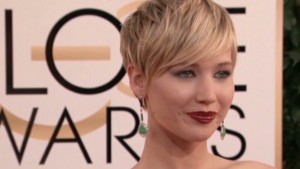 FBI's role in celeb hack investigation
FBI's role in celeb hack investigation 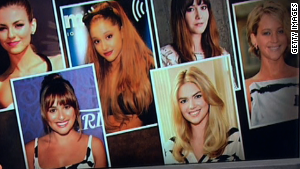 Who hacked and posted celebs nude pics?
Who hacked and posted celebs nude pics? 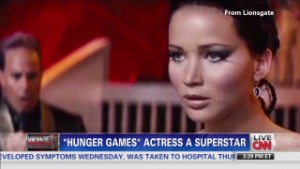 Jennifer Lawrence's rise to fame
Jennifer Lawrence's rise to fame 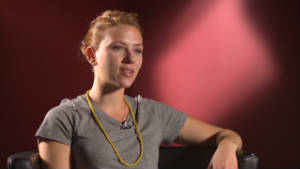 Scarlett Johansson on privacy, stardom
Scarlett Johansson on privacy, stardom
Some of the alleged victims in the celebrity hacking case "have engaged with the FBI," a U.S. official told CNN's Pamela Brown Monday.
The Los Angeles office of the FBI successfully investigated another hacker who stole nude photos, scripts and personal information from the e-mail accounts of entertainers including Scarlett Johansson, Mila Kunis and Christina Aguilera in 2011.
accounts of entertainers including Scarlett Johansson, Mila Kunis and Christina Aguilera in 2011.
 accounts of entertainers including Scarlett Johansson, Mila Kunis and Christina Aguilera in 2011.
accounts of entertainers including Scarlett Johansson, Mila Kunis and Christina Aguilera in 2011.
"The FBI is aware of the allegations concerning computer intrusions and the unlawful release of material involving high profile individuals, and is addressing the matter," FBI spokeswoman Laura Eimiller said Monday. "Any further comment would be inappropriate at this time."
The previous case, which resulted in a Florida man being sentenced to 10 years in prison, involved hacking through the "forgot my password" function on celebrity e-mail accounts. Cyber-security experts are now pointing the finger at a flaw in Apple's "Find My Phone" app that opened access to celebrities' data stored in iCloud .
.
 .
.
Apple confirmed to CNN Monday that it is looking into reports that its popular iCloud online data backup service may have been compromised by the hackers.
may have been compromised by the hackers.
 may have been compromised by the hackers.
may have been compromised by the hackers.
"We take user privacy very seriously and are actively investigating this report," Apple spokeswoman Natalie Kerris said.
Actress Kirsten Dunst, one of the hacker's targets, tweeted "Thank you iCloud." She added emoticons that graphically expressed her dissatisfaction with the service.
Celebrity blogger Perez Hilton posted what he said were naked photos of Lawrence and actress Victoria Justice, but he later took them down.
"Upon further reflection and just sitting with my actions, I don't feel comfortable even keeping the censored photos up. I am removing them," Hilton tweeted. "At work we often have to make quick decisions. I made a really bad one today."
The leaked photos sparked an online backlash, with some of the targeted celebrities decrying them as fake while others confirmed they're real.
"To those of you looking at photos I took with my husband years ago in the privacy of our home, hope you feel great about yourselves," actress Mary Elizabeth Winstead wrote.
"Knowing those photos were deleted long ago, I can only imagine the creepy effort that went into this. Feeling for everyone who got hacked."
Some celebrities said the photos were doctored.
Photos claiming to show Ariana Grande are "completely fake," someone close to the singer said. Justice said pictures purporting to be of her are not real, either.
Hacking of celebrity accounts has become more popular in recent years.
Two years ago, a judge sentenced Christopher Chaney of Florida to 10 years in federal prison for hacking the e-mail accounts of 50 entertainment industry figures.
The first real case of a celebrity hacking was in 2005. Hackers logged into Paris Hilton's phone and stole photos of the reality star, said Mikko Hypponen, chief research officer at computer security company F-Secure, in 2011.
At the time, the hackers broke into Hilton's phone by guessing the not-so-secret answer to her security question, which was "tinkerbell" -- the name of her pet Chihuahua.
How did private, nude photos of Jennifer Lawrence and other celebrities get leaked all over the Internet Sunday?
It was a combination of weak passwords, easy-to-guess security questions and a bug in Apple's photo backup service that has since been fixed.This was possible, because of a bug in the system Apple uses to remotely store photos and documents: iCloud.
Related story: Naked celeb hack lesson - 'delete' doesn't mean delete
Well-guarded systems only let users guess passwords a handful of times before blocking access. But until this week, Apple's iCloud service allowed people to guess passwords over and over again. It would never lock out. Eventually, hackers hit it right.
Also a likely culprit: the "forgot my password" feature. If you don't remember your password, the system asks you security questions to grant access. These actresses, models and singers lead public lives, and answers to questions about their past are easily found on Wikipedia and elsewhere.
It's similar to what happened to Alaska's former governor, Sarah Palin. Hackers accessed her personal email account. One of the security questions she had set to retrieve her password was her birthday.
Related: FBI investigating hacking attack on JPMorgan
Apple assured the public these hackers did not break into the company's core computer systems, which house all of its users' data. So iCloud itself was not hacked.
"Certain celebrity accounts were compromised by a very targeted attack on user names, passwords and security questions, a practice that has become all too common on the Internet," Apple said in a statement. "None of the cases we have investigated has resulted from any breach in any of Apple's systems including iCloud or Find my iPhone."
But this is another event that stresses the importance of secure passwords. Celebrities are already prime targets of malicious behavior, so they need to be especially careful online with extra precautions to keep hackers at bay. Strong, hard-to-guess passwords are a must.
Passphrases are especially strong passwords, particularly ones that are easy to remember but are long and hard to guess (example: "1 Day I ate 364 bananas & 13 cherry Pies!!!").
Related: Hackers attack Sony PlayStation Network
It's also vital to use password-protecting tools like two-factor authentication. That option, available on most email or file-sharing platforms, is a second, temporary password that usually arrives in the form of a text message.
It prevents anyone from accessing your account without also being in possession of your phone. And it would have prevented this.
Jennifer Lawrence's rep: Stolen photos are 'flagrant violation of privacy'
updated 9:19 PM EDT, Sun August 31, 2014

A rep for Jennifer Lawrence, who won an Academy Award in 2013 for her role in "Silver Linings Playbook," says photos of the actress posted online were stolen.
STORY HIGHLIGHTS
- NEW: An individual close to Ariana Grande says photos claiming to show her are "completely fake"
- Online posts purport to show nude photographs of actress Jennifer Lawrence
- Her publicist says it's a "flagrant violation of privacy" and authorities have been notified
- Other celebrities also report they were hacked
"The authorities have been contacted and will prosecute anyone who posts the stolen photos of Jennifer Lawrence," the publicist said in a written statement.
Posts on 4chan, Reddit, Twitter and Tumblr claim to include nude photographs of Lawrence, who won an Academy Award last year for her role in "Silver Linings Playbook."
Twitter posts on verified accounts of several other celebrities Sunday also reported hacks.
"To those of you looking at photos I took with my husband years ago in the privacy of our home, hope you feel great about yourselves," actress Mary E. Winstead wrote.
"Knowing those photos were deleted long ago, I can only imagine the creepy effort that went into this. Feeling for everyone who got hacked."
Some celebrities claimed the photos were doctored.
An individual close to singer Ariana Grande told CNN photos claiming to show her are "completely fake."
And actress Victoria Justice said pictures purporting to be her are fake.
 Jennifer Lawrence's rise to fame
Jennifer Lawrence's rise to fame  Scarlett Johansson on privacy and stardom
Scarlett Johansson on privacy and stardom
This isn't the first time celebrities have accused hackers of stealing risque photos.
A judge sentenced Christopher Chaney of Florida to 10 years in federal prison in 2012 for stealing nude photos, scripts and personal information from the e-mail accounts of 50 entertainment industry figures, including movie stars Scarlett Johansson and Mila Kunis and singer Christina Aguilera.
The first real case of a celebrity hacking attack was in 2005 when hackers logged into Paris Hilton's phone and stole photos of the reality star, Mikko Hypponen, chief research officer at computer security company F-Secure told CNN in 2011. Those hackers reportedly were able to break into Hilton's phone by correctly guessing the not-so-secret answer to her security question, which was "tinkerbell," the name of her pet Chihuahua.
CNN's Rachel Wells, Dave Alsup, Alan Duke and John D. Sutter contributed to this report.
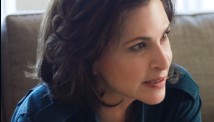
Who's at fault over J-Law's nude photo hack?
updated 8:15 AM EDT, Tue September 2, 2014
Your video will play in 0 secs
STORY HIGHLIGHTS
- An anonymous poster put hundreds of nude photos of big celebs on message board
- Peggy Drexler: This is not just a violation of privacy; it's criminal invasion but hard to prosecute
- She says the debate should be over making this illegal, not over taking nude photos
- Drexler: The problem isn't the wisdom of photos or hacking iCloud
 ; it's the perpetrator
; it's the perpetrator
Editor's note: Peggy Drexler is the author of "Our Fathers, Ourselves: Daughters, Fathers and the Changing American Family" and "Raising Boys Without Men." She is an assistant professor of psychology at Weill Cornell Medical College of Cornell University and a former gender scholar at Stanford University. Join her on Facebook and follow her on Twitter @drpeggydrexler. The opinions expressed in this commentary are solely those of the author.
of Cornell University and a former gender scholar at Stanford University. Join her on Facebook and follow her on Twitter @drpeggydrexler. The opinions expressed in this commentary are solely those of the author.
(CNN) -- The latest nude celebrity photo leak is yet another case of how the Internet often lets people do whatever they want to whomever they want. of Cornell University and a former gender scholar at Stanford University. Join her on Facebook and follow her on Twitter @drpeggydrexler. The opinions expressed in this commentary are solely those of the author.
of Cornell University and a former gender scholar at Stanford University. Join her on Facebook and follow her on Twitter @drpeggydrexler. The opinions expressed in this commentary are solely those of the author.
On Sunday, a user of anonymous Internet message board 4chan posted hundreds of nude photos of some of Hollywood's biggest celebrities, including actress Jennifer Lawrence and model Kate Upton. The poster claimed photos of Victoria Justice and Ariana Grande were included, but the singer/actresses deny that the photos are real.

Peggy Drexler
Representatives and the women themselves have begun issuing their denials (in the case of Justice and Grande) and confirmations (in the case of Lawrence and Upton). A representative for Lawrence confirmed in an email to Buzzfeed that the images were stolen from the actress' iCloud
to Buzzfeed that the images were stolen from the actress' iCloud account.
account.
 to Buzzfeed that the images were stolen from the actress' iCloud
to Buzzfeed that the images were stolen from the actress' iCloud account.
account.
"This is a flagrant violation of privacy," the representative said. "The authorities have been contacted and will prosecute anyone who posts the stolen photos of Jennifer Lawrence."
Of course, what happened here is more than a violation of privacy; it's flat-out criminal invasion. Prosecution, however, may be something of a long shot. Although a Florida man responsible for breaking into the private email accounts of more than 50 celebs and posting many explicit photos online is serving 10 years in prison, the law is only just beginning to catch up to the problem of what is broadly referred to as "revenge porn," or the unauthorized posting of explicit content without the consent of the individual.
Most websites that host these photos are protected by a federal law that absolves them of responsibility for material posted by third parties. It's legal in most of the United States, and only a few states -- about 12 -- have laws that make posting on such sites a crime ... if you can even find out who the poster is.
These unclear, largely ineffectual laws have in turn encouraged a culture of victim blaming, which we're seeing here in full force.
Peggy Drexler
Peggy Drexler
Prosecuting depends on first determining who uploaded the photo and where the photo originated. A California law, for example, did not, until just last week, protect victims who took the photos themselves.
These unclear, largely ineffectual laws have in turn encouraged a culture of victim-blaming, which we're seeing here in full force. Consider that the biggest headlines haven't been along the lines of "How can someone can do this and get away with it?" but a debate over who bears greater blame: Apple's iCloud or the women themselves.
Certainly, the surest way to avoid ever having your most private photos shared publicly is to not take them in the first place. This is the philosophy behind the most common advice given to teens, among whom the rates of "sexting" continue to rise. Trust no one. Share nothing. Even better: Take nothing.
While we're at it: Don't leave the house. After all, you could get mugged, or raped. You'd better not fly on a jet, either, what with all the terrorism and overworked pilots. Swim in the ocean? No way: sharks!
It's ridiculous logic.
And yet much of the reaction to the celebrity leak has fallen prey to such logic, questioning why these celebrities would take such risqué—and risky—photos in the first place. For this reason, taking nude photos is most definitely a right to fight for, if only because ceasing to do so is a form of victim blaming, and far more harmful than protective.
The blame for a crime lies not with the victim but with the criminal. Jennifer Lawrence was not naïve, or tacky, or any number of criticisms that have been and surely will be lobbed at her, for posing for provocative photos. She was a normal young woman. And I suspect that we're more shocked by the fact that Lawrence had a glass of wine and posed naked for a boyfriend than the fact the image is now ours to see. We've become accustomed to knowing everything about everyone.
Actress Mary Elizabeth Winstead, one of the victims, received responses to her tweet, "To those of you looking at photos I took with my husband years ago in the privacy of our home, hope you feel great about yourselves," that echoed this sentiment: "@M_E_Winstead Stop posing nude on camera, dummy. Your husband not know what you look like nude? #LessonLearned." She has since gone silent on Twitter.
The message, of course, isn't that it's heinous to so publicly and maliciously invade someone's privacy but that these women brought their misfortune on themselves. After all, it wouldn't have happened to them if they didn't take the photos.
But the first step to protecting our privacy both online and off isn't to demand that Apple make a stronger iCloud or to start stripping our storage spaces of anything private. Nor is it to insist that women stop taking nude photos of themselves or, for that matter, stop engaging in any activity they wouldn't want to be made public. Instead, it's to take these crimes seriously and hold their executors accountable. The problem isn't the picture. It's the perpetrator.
From Around the Web
- 15 Foods You Should Never Order at a Restaurant Reader's Digest
- 15 Celebs Who Regularly Attend Church Styleblazer
- 10 Unsafe US Cities Not Worth Visiting EscapeHere
- 5 Habits That Lead To Depression Lifespan
More from CNN
- Susan Sarandon's 'guard dogs' take vacation, burglars hit actress's home CNN Entertainment
- The world's most popular beer is ... News - Galleries
- Obama's 'cautious' approach on ISIS is panned CNN Politics
From Around the Web
- The Main Causes and Symptoms of Liver Cancer ActiveBeat
- 8 Signs of an Irregular Heartbeat ActiveBeat
- 15 Celebs Who Regularly Attend Church Styleblazer
- 3 Celeb Brides Take Over Labor Day Weekend Styleblazer
More from CNN
- The world's most popular beer is ... News - Galleries
- Paula Patton spotted at Emmys party CNN The Marquee Blog

No comments:
Post a Comment